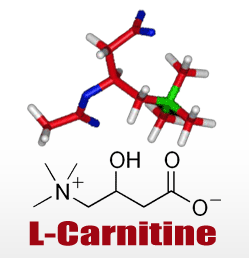 For several years now, alternative medicine and anti-aging nutrition experts have extolled the virtues of the substance L-carnitine. Citing a truckload of benefits that it supplies to your overall body, everyone from body builders, to nutritionists, to Dr. Oz have jumped on the take L-carnitine for your health, wagon. Even I have recommended it to my patients. Yet, recent research shows that we may have overlooked something significant about its effect on your heart. Let me tell you about it…
For several years now, alternative medicine and anti-aging nutrition experts have extolled the virtues of the substance L-carnitine. Citing a truckload of benefits that it supplies to your overall body, everyone from body builders, to nutritionists, to Dr. Oz have jumped on the take L-carnitine for your health, wagon. Even I have recommended it to my patients. Yet, recent research shows that we may have overlooked something significant about its effect on your heart. Let me tell you about it…
The Latest News About L-Carnitine and Your Heart
For years, bodybuilders have supplemented with higher than average doses (500-1000 mg daily) of L-carnitine for the increased energy, gains in muscle mass, and fat burning ability it was believed to give. It’s also been recently added to popular consumer energy drinks. Even the fairly conservative and traditional medical institution, the University of Maryland Medical Center, has, as late as July 2013, cited the many research study-supported health virtues of certain types of L-carnitine which include:
1. Heart/Vascular: L-carnitine can help stabilize angina, help heal heart tissues after a heart attack (not all studies agree), reduce symptoms of heart failure, increase exercise capacity. Reduce symptoms of peripheral vascular disease (pain in the legs after walking short distances from insufficient blood flow). Researchers are quick to point out, though, that these studies used propionyl L-carnitine and they weren’t sure if “regular” L-carnitine (type in supplements or red meat, etc) would do the same.
2. Diabetic Neuropathy. Studies using acetyl L-carnitine have demonstrated that it may help reduce the nerve pain of diabetic neuropathy – a condition caused by high blood sugar levels.
3. Alzheimer Disease/Memory Impairment: Acetyl L-carnitine may possibly improve symptoms associated with Alzheimer disease – namely memory and depression.
4. Kidney Disease. Carnitine is made in the kidneys and kidney disease patients could have low levels of carnitine. Supplementing with L-carnitine could benefit their health.
5. Male infertility, Sexuality Dysfunction, Penile Conditions. L-carnitine was thought to benefit men with low sperm counts and motility, erectile dysfunction, Peyronie disease (a painful curvature of the penis during erection).
6. Hyperthyroidism. L-carnitine is thought to help improve symptoms of overactive thyroid such as insomnia, nervousness, heart palpitations, tremors. Yet, L-carnitine could create a deficit in thyroid hormone for people with underactive thyroids.
A study out of the Cleveland Heart Clinic in April 2013, not mentioned on University of Maryland’s L-carnitine page, seemed to throw a wet blanket on other heart benefits of L-carnitine. This particular study showed that it wasn’t all the animal fat in red meat that’s bad for your heart – it was actually the amount of L-carnitine contained in it.
Apparently, the Cleveland Clinic study showed that L-carnitine – whether obtained from foods or supplements – becomes converted in the gut to a protein called trimethylamine N-oxide, or TMAO. TMAO was shown to contribute to atherosclerosis – a condition in which plaque builds up in the arteries of the heart and likely the vascular system of the entire body. Diets that contain higher levels of L-carnitine also produce higher levels of the bacteria that produce the TMAO.
Interestingly, though, long-time vegetarians who were given a large level of L-carnitine didn’t get this buildup of plaque. Their gut did not contain the bacteria that created TMAO, or contained very little of it. The researchers concluded that your long-time dietary patterns decide which bacteria grow in your gut – those that produce TMAO (in omnivore or carnivore diets) or those that don’t (vegan). Red meat (especially lamb) contains the highest levels of L-carnitine, followed by dairy.
My Recommendation
These findings support what cardiologists have been telling their patients for some time – but for different reasons – decrease red meat, especially antibiotic/hormone fed beef that likely contributes to the imbalance of gut bacteria that produces TMAO, and dairy in your diet. Now we know it’s not the animal fat but the high L-carnitine levels that can lead to atherosclerosis. However, more studies are needed to better determine the health effects of L-carnitine.
For now, I would recommend you not to take L-carnitine supplements in amounts greater than 200 mg daily, unless you have a specific carnitine deficiency and you’ve been recommended by your doctor to do so. Eating more naturally containing L-carnitine foods, like fish, poultry, whole wheat, asparagus, avocados and peanuts, can help boost your levels. Taking a good probiotic daily can also help you decrease undesirable levels of TMAO in your gut and keep your heart and vascular system healthy.
Stay Well,
Ron Blankstein, M.D.
http://umm.edu/health/medical/altmed/supplement/carnitine-lcarnitine
http://www.sciencedaily.com/releases/2013/04/130407133320.htm
